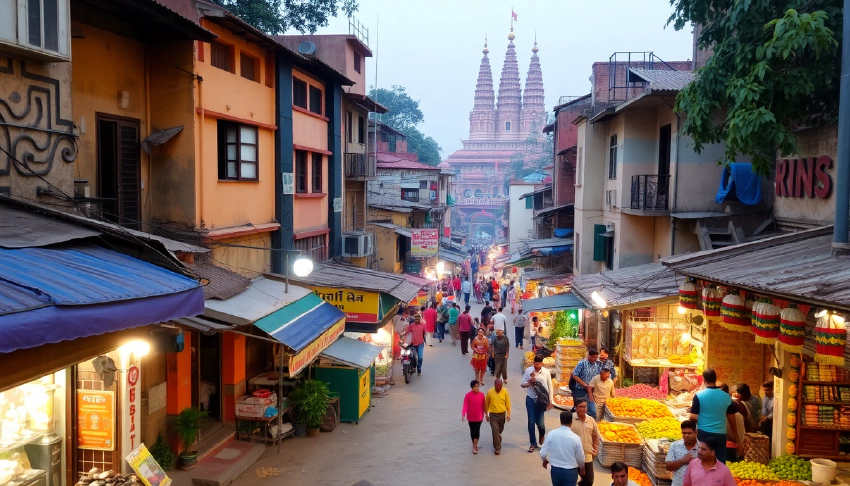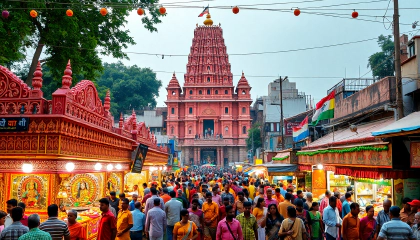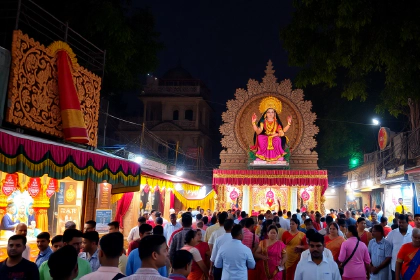
Chittaranjan Park: Delhi's Little Kolkata Unveiled
Exploring Chittaranjan Park: Delhi’s Little Kolkata
Nestled in the heart of South Delhi, Chittaranjan Park (CR Park) stands as a vibrant testament to the rich Bengali culture thriving in India’s capital. This unique neighborhood, often referred to as “Little Kolkata,” offers visitors and residents alike a captivating blend of tradition and modernity. From its bustling markets to its cultural landmarks, CR Park invites exploration and promises an unforgettable experience of Bengali heritage in Delhi.
The Historical Tapestry of Chittaranjan Park
From Refugee Settlement to Cultural Hub
CR Park’s journey began in the aftermath of India’s partition, as a settlement for Bengali refugees from East Pakistan (now Bangladesh). Originally known as the East Pakistan Displaced Persons (EPDP) Colony, it was later renamed Chittaranjan Park in honor of the Bengali freedom fighter Chittaranjan Das.
Evolution of a Community
Over the decades, CR Park has transformed from a rocky, barren area into a thriving, upscale neighborhood. The initial 2,147 plots allocated to Bengali families have grown into a bustling community of over 50,000 residents. This evolution reflects not just urban development but also the resilience and cultural pride of its inhabitants.
Architectural and Urban Layout
Residential Blocks and Green Spaces
CR Park is meticulously organized into alphabetical blocks (A to K), each featuring a mix of traditional Bengali-style houses and modern apartments. Interspersed throughout are numerous parks and green spaces, with the expansive Mela Ground serving as the neighborhood’s central recreational area.
Commercial Centers and Markets
The neighborhood boasts four main markets, each with its distinct character. These vibrant commercial hubs are a foodie’s paradise, offering everything from fresh fish to traditional Bengali sweets. The markets also serve as social spaces, embodying the Bengali concept of “AddA” - lively, informal gatherings and conversations.
Cultural Landmarks and Institutions
Temples and Religious Centers
At the heart of CR Park’s cultural life is the Kali Mandir, a magnificent temple complex that serves as a focal point for religious and cultural activities. This temple, along with others in the area, plays a crucial role in preserving and celebrating Bengali traditions.
Educational and Cultural Organizations
The Raisina Bengali School, established in the 1970s, stands as a pillar of Bengali education in Delhi. Cultural institutions like the Chittaranjan Park Bangiya Samaj organize year-round events, fostering a strong sense of community and cultural identity.
Festivals and Celebrations: The Soul of CR Park
Durga Puja: A Spectacular Showcase
CR Park truly comes alive during Durga Puja, transforming into a mini-Kolkata with elaborate pandals (temporary structures), cultural performances, and food festivals. This annual celebration attracts visitors from across Delhi and beyond, offering a unique glimpse into Bengali culture.
Year-Round Cultural Calendar
Beyond Durga Puja, CR Park maintains a vibrant cultural calendar. From Saraswati Puja to Kali Puja, and numerous literary and artistic events, the neighborhood pulsates with Bengali culture throughout the year.
The Changing Face of Chittaranjan Park
Demographic Shifts and Cultural Integration
While CR Park remains predominantly Bengali, recent years have seen an influx of diverse communities. This demographic shift has led to a fascinating blend of cultures, with CR Park emerging as a microcosm of Delhi’s multicultural ethos.
Urban Challenges and Community Responses
Like many urban neighborhoods, CR Park faces challenges such as increasing population density and modernization pressures. However, the community’s strong sense of identity and active resident welfare associations work tirelessly to preserve the area’s unique character while adapting to change.
Conclusion
Chittaranjan Park stands as a testament to the power of cultural identity in shaping urban spaces. It offers a unique window into Bengali culture within the diverse tapestry of Delhi, inviting both residents and visitors to experience the richness of its traditions, the warmth of its community, and the dynamism of its evolving urban landscape. As CR Park continues to navigate the challenges of modern urban life, it remains a vibrant symbol of cultural resilience and adaptation, a true “Little Kolkata” in the heart of India’s capital.





